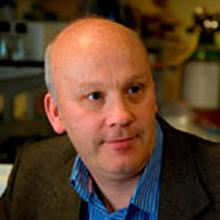New blood test ‘could detect cancer’
An ‘early warning’ test for cancer is being developed by scientists from the University of Southampton.
The test would look for tell-tale signs in the blood long before symptoms appear and could save thousands of lives every year. In trials to date, researchers have been able to distinguish cancerous cells from normal cells in blood samples with a high degree of certainty, and, using this information, they are currently working on the development of a test to spot early signs of breast cancer in women.
The University of Southampton research team has access to a unique data bank of blood samples taken from 11,000 healthy women on Guernsey over a period of 30 years. During this time, some of the women have developed breast cancer. In addition, the researchers have further blood samples now being collected in the Wessex region.
The scientists can measure certain proteins in the blood samples and identify the biomarkers – or “cancer footprint” in the women who have cancer from those who do not. Most cancers are only diagnosed with scans after the patient begins to feel ill or feels a lump or spot.
It is hoped that it will be possible to have a single blood test which will be able to identify these characteristics and diagnose the early signs of cancer.
Dr Paul Townsend from the University of Southampton’s Human Genetics Division, who is leading the study, along with Professor Graham Packham and Dr Nick Murray, says, "We are trying to find out if we can take a sample from a healthy person and predict whether they could get cancer in the future. Already we have seen significant bio-markers of breast cancer in the samples.
"It’s very early days in terms of our research but it is looking encouraging at the moment. There’s a lot more work to be done but I’m hopeful we could have something in terms of a basic theory quite soon.’ These views have been supported by Professor Peter Johnson, Professor of Clinical Oncology at the University.
"It is possible if all is successful that a test in the clinic could be available within the next 10 years," added Dr Townsend.
More than 150,000 Britons die from cancer each year. Lung cancer is by far the biggest killer – with more than 30,000 deaths – followed by bowel cancer and breast cancer.
Early detection of cancer is a major factor in determining the success of subsequent treatment. Screening programmes for some cancers have been introduced to provide that early detection and these have played a significant role in reducing mortality rates. However, effective methods of screening only exist for a few cancers and, for these, the techniques used involve processes that are either uncomfortable or invasive or both.
The possibility of developing a method of screening for a wider range of cancers which provides even earlier detection could provide huge dividends. An all-purpose cancer blood test could be quicker, cheaper, more accurate and less invasive than other tests. Breast cancer screening, for example, is offered only every three years for women between 50 and 70 years old. Earlier diagnosis could add to the 1,400 lives thought to be saved every year by the existing programme.
Pilot and ongoing research has been funded by Wessex Medical Research (formally Hope). In addition, the Wessex Cancer Trust has undertaken to raise the necessary funds to purchase a machine for the Human Genetics and Cancer Sciences Divisions of the University of Southampton, to undertake proteomic analysis to identify novel cancer biomarkers – the finger-printing is hoped to identify the early signs of the onset of cancer.
The Guernsey surgeon, Mr Roger Allsopp and the Imperial Cancer Research Fund (now CR-UK) who started collecting the Guernsey blood samples in the 1960s did so in the hope they would later be used for research.
